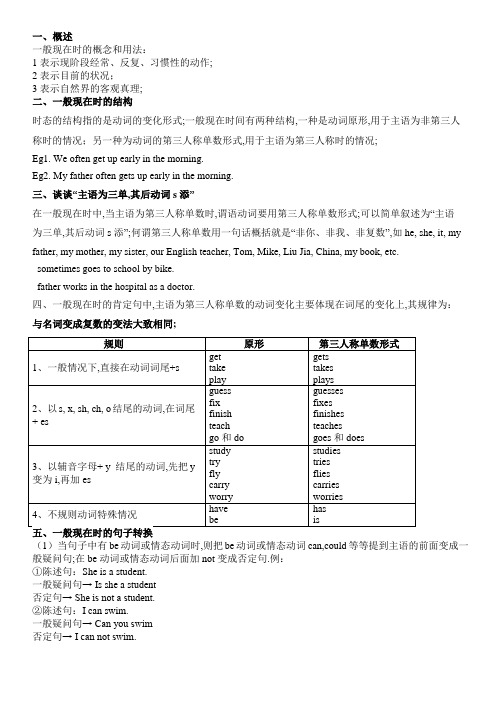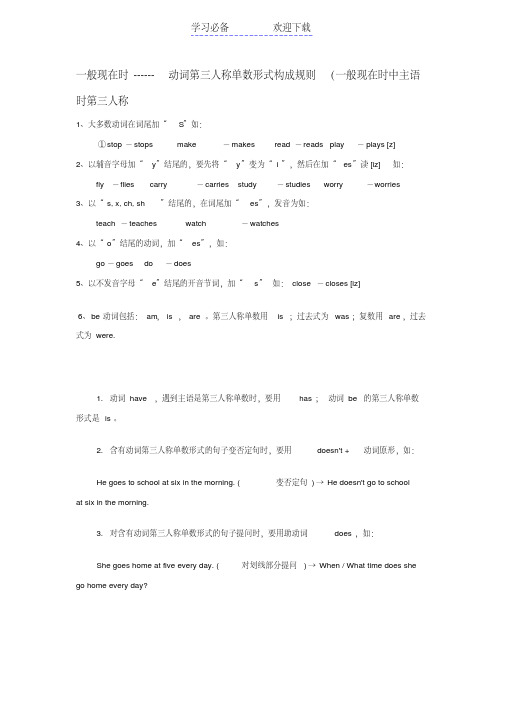一般现在时中动词的第三人称单数变化规则
初中一般现在时及三单动词的变化规则

初中一般现在时及三单动词的变化规则
一般现在时的构成:
肯定句:主语+动词原形+其他成分
否定句:主语 + do/does not + 动词原形 + 其他成分
疑问句:(特殊疑问词) + do/does + 主语 + 动词原形 + 其他成分三单动词的变化规则:
一般现在时第三人称单数的动词变化规则是在动词原形末尾加上 -s 或 -es。
大多数动词直接在原形后加-s:
例如:play → plays
study → studies
以 -sh, -ch, -s, -x, -o结尾的动词,在原形后加 -es:
例如:watch → watches
teach → teaches
miss → misses
fix → fixes
do → does
其他一些特殊情况:
以辅音字母+y结尾的动词,将y变为i,再加-es:
例如:fly → flies
study → studies
以元音字母+y结尾的动词,直接加-s:
例如:play → plays
enjoy → enjoys
以-o结尾的动词,大多数加-es:
例如:do → does
go → goes
但也有例外,像是have、go这些常用的动词变化为has和goes。
需要注意的是,不可数名词和第三人称单数主语时,一般现在时动词不变化,依然使用动词原形:
例如:Water boils at 100 degrees Celsius.
She sings beautifully.。
一般现在时动词第三人称单数变化规则

一、概述一般现在时的概念和用法:1表示现阶段经常、反复、习惯性的动作;2表示目前的状况;3表示自然界的客观真理;二、一般现在时的结构时态的结构指的是动词的变化形式;一般现在时间有两种结构,一种是动词原形,用于主语为非第三人称时的情况;另一种为动词的第三人称单数形式,用于主语为第三人称时的情况;Eg1. We often get up early in the morning.Eg2. My father often gets up early in the morning.三、谈谈“主语为三单,其后动词s添”在一般现在时中,当主语为第三人称单数时,谓语动词要用第三人称单数形式;可以简单叙述为“主语为三单,其后动词s添”;何谓第三人称单数用一句话概括就是“非你、非我、非复数”,如he, she, it, my father, my mother, my sister, our English teacher, Tom, Mike, Liu Jia, China, my book, etc.sometimes goes to school by bike.father works in the hospital as a doctor.四、一般现在时的肯定句中,主语为第三人称单数的动词变化主要体现在词尾的变化上,其规律为:与名词变成复数的变法大致相同;(2)当句子中即没有be动词,也没有情态动词时,则在主语前加助动词do you,以及复数, does单数she,he,it变成一般疑问句;在主语后谓语动词前加助动词don’tI,you,以及复数, doesn’t单数she,he,it变成否定句,助动词后的动词要变成动词原形;例:①陈述句:We get up at 7:00 every morning.一般疑问句→Do you get up at 7:00 every morning否定句→We don’t get up at 7:00 every morning.②陈述句:She has a little brother.一般疑问句→ Does she have a little brother否定句→ She doesn’t have a little brother.哪些主语是第三人称单数1、人称代词he, she, it;如:He likes watching TV. 他喜欢看电视;She has lunch at twelve. 她十二点吃午餐;It looks like a cat. 它看起来像只猫;2、单个人名、地名或称呼作主语;是第三人称单数;如:Han Mei looks like her mother. 韩梅看起来像她的母亲;Beijing is in China. 北京在中国;Uncle Wang often makes cakes. 王叔叔经常做蛋糕;3、单数可数名词或this / that / the + 单数可数名词作主语时,是第三人称单数;A horse is a useful animal. 马是有用的动物;This book is yours. 这本书是你的;That car is red. 那辆小汽车是红色的;The cat is Lucy's. 只猫是露茜的;4、不可数名词作主语时为第三人称单数;如:The milk is in the glass.牛奶在玻璃杯里;The bread is very small. 那面包很小;The water is very cold. 那些水很凉;1、写出下列动词的第三人称单数;drink ________ go _______ stay ________ make ________ look _________have_______ pass_______ carry _______ come________ watch________plant_______ fly ________ study_______ brush________ teach________catch_________ wash___________do________ like________ say_______learn ___________eat___________ read___________ sing___________ buy__________study_______ come__________plant种植______2、用括号内动词的适当形式填空;1. He often ________have dinner at home.2. We _____________ not watch TV on Monday.3. Nick ___________ not go to the zoo on Sunday.4. ________ they __________ like the World Cup5. What _________they often _________ do on Saturdays6. _________ your parents _________ read newspapers every day7. There ________be some water in the bottle.8. My aunt _______look after her baby carefully.9. The child often _______watch TV in the evening.10. Mike’s sister ________ cook nice food. I _______ like eating it very much.11. _______ do your brother_______ watch TV in the evening No, he_______ not.12. We often___________play in the playground.13. He _________get up at six o’clock.brush your teeth every morning.15. What________ do he usually______ do after school studyEnglish,Chinese,Maths,Science and Art at school.17. Mike sometimes __________go to the park with his sister.18. At eight at night, she often__________watch TV with his parents.19. ________ Mike________read English every daymany lessons_________your classmate________have on Monday 21. What time_________his mother_________do the housework_____________ go to school on foot every day .______________ not have any lessons on Sundays ._____________ brush her teeth twice a day .students ____________ be not good at boating .Hua always ____________ carry water for his grandpa on Sundays . ____________ like making friendslazy boy ______________ not do his homework in the evening . many classes _________you __________ have every day__________the baby ___________ look likecan ___________ teach us Enlgish well .11. He often ________have dinner at home.12. Daniel and Tommy _______be in Class One.13. Nick _________not go to the zoo on Sunday.14. What _______they often _______do on Saturdays15. _______ your parents _______read newspapers every day16. The girl ____________teach us English on Sundays.17. She and I ________take a walk together every evening.18. There ________be some water in the bottle.19. They _______have the same hobby.20. My aunt __________look after her baby carefully.21. You always _______do your homework well.22. I _______be ill. I’m staying in bed.23. She _______go to school from Monday to Friday.24. The child often ____________watch TV in the evening.day _______be it today -It’s Saturday.26. He _________ get up at six o'clock.1. I ________to school at 7:00 in the morning.A. goB. goingC. goes2. They _______books every day in the library.B. readC. reading3. The monkey________ eating bananas very much.B. likesC. liking4. My father ________to read newspaper after supper every day.B. likesC. liking5. I like watching TV, but my mother _________like it.A. don’tB. doesn’tC. does6. ____________ your father drink milk every dayB. areC. does7. We will go shopping if it____ tomorrow.'t rain B. didn't rain 't rain D. isn't rain8. He said the sun ____in the east and ____in the west.A rose; setB rises; setsC rises, setD rise; setsMei ____ music and often ____ to music.A like; listenB likes; listensC like; are listeningD liking ; listen10. Jenny____ English every evening.A has studyB studiesC studyD studied3、选出正确的答案:1. She like / likes to play football.2. He like / likes drinking milk.3. I like / likes to watch TV.4. We like / likes to play badminton.5. They like / likes to sing songs.6. She read / reads books every day.7. He play / plays computer games every day.8. It listen / listens to the radio every day.9. Linda draw / draws pictures every day.10. Jane and Linda play / plays football every day.5、把下列句子变为否定句:1. We like playing football.2. Linda swims every day.3. They like playing games.4. My father reads newspaper in the evening.7、把下列句子变为疑问句,并做肯定和否定回答;1. My brother can ride a horse.2. We clean the classroom after school.___________________________________________________________。
第三人称单数变化规则

一般现在时动词三单变化规则

一般现在时动词三单变化规则一般现在时是英语语法中最基本的时态之一。
当我们谈论一种普遍的情况、习惯或者说一个真理时,我们都会用到这个时态。
在一般现在时中,动词的变化分为两种情况:一是非第三人称单数,二是第三人称单数。
一、非第三人称单数的动词变化规则:在非第三人称单数时,大多数动词的变化规则是在动词原形后面加上s或es,这取决于动词的结尾是什么。
如:I like to swim.(我喜欢游泳。
)She works hard.(她工作努力。
)They play tennis every weekend.(他们每周末打网球。
)但是,当动词的结尾是s, x, z, ch, sh等半元音或辅音加上o 时,要在动词原形后面加上es。
如:He goes to school every day.(他每天去学校。
)She fixes her bike herself.(她自己修自行车。
)The boss buzzes around the office.(老板在办公室里四处走动。
)二、第三人称单数的动词变化规则:在第三人称单数时,大多数动词的变化规则是在动词原形后面加上s或es,这取决于动词的结尾是什么。
如:He runs every morning.(他每天早上跑步。
)She reads a book before bed.(她睡前看一本书。
)The cat eats fish.(猫吃鱼。
)但是,当动词的结尾是s, x, z, ch, sh等半元音或辅音加上o 时,要在动词原形后面加上es。
另外,以辅音+y结尾的动词,要改为以i结尾,再加es。
如:He goes to school every day.(他每天去学校。
)She fixes her bike herself.(她自己修自行车。
)The boss buzzes around the office.(老板在办公室里四处走动。
)He studies hard every day.(他每天努力学习。
完整版一般现在时动词第三人称单数变化规则

一、概述一般现在时的概念和用法:(1)表示现阶段经常、反复、习惯性的动作;(2)表示目前的状况;(3)表示自然界的客观真理。
二、一般现在时的结构时态的结构指的是动词的变化形式。
一般现在时间有两种结构,一种是动词原形,用于主语为非第三人称时的情况;另一种为动词的第三人称单数形式,用于主语为第三人称时的情况。
Eg1. We often get up early in the morning.Eg2. My father ofte n gets up early in the morning.三、谈谈主语为三单,其后动词s添”在一般现在时中,当主语为第三人称单数时,谓语动词要用第三人称单数形式。
可以简单叙述为主语为三单,其后动词s添”。
何谓第三人称单数?用一句话概括就是非你、非我、非复数”,如he, she, it, my father, my mother, my sister, our English teacher, Tom, Mike, Liu Jia, China, my book, etc.Eg3.He sometimes goes to school by bike.Eg4.My father works in the hospital as a doctor.四、一般现在时的肯定句中,主语为第三人称单数的动词变化主要体现在词尾的变化上,其规律为:(与名词变成复数的变法大致相同。
)五、一般现在时的句子转换(1)当句子中有be动词或情态动词时,则把be动词或情态动词(can,could等等)提到主语的前面变成一般疑问句;在be动词或情态动词后面加not变成否定句.例:①陈述句:She is a student. 一般疑问句—Is she a stude nt? 否定句—She is not a stude nt.②陈述句:I can swim.一般疑问句—Can you swim否定句f I can not swim.(2)当句子中即没有be动词,也没有情态动词时,则在主语前加助动词do (you,以及复数),does(单数she,he,it)变成一般疑问句;在主语后谓语动词前加助动词don' t I,you,以及复数),doesn '单数she,he,i)变成否定句,助动词后的动词要变成动词原形。
动词第三人称单数形式构成规则

一般现在时------动词第三人称单数形式构成规则(一般现在时中主语时第三人称1、大多数动词在词尾加“S”如:①stop-stops make-makes read-reads play-plays [z]2、以辅音字母加“y”结尾的,要先将“y”变为“i”,然后在加“es”读[iz] 如:fly-flies carry-carries study-studies worry-worries3、以“s, x, ch, sh”结尾的,在词尾加“es”,发音为如:teach-teaches watch-watches4、以“o”结尾的动词,加“es”,如:go-goes do-does5、以不发音字母“e”结尾的开音节词,加“s”如: close-closes [iz]6、be动词包括:am, is, are。
第三人称单数用 is;过去式为 was;复数用are,过去式为were.1. 动词 have ,遇到主语是第三人称单数时,要用 has;动词 be 的第三人称单数形式是is。
2. 含有动词第三人称单数形式的句子变否定句时,要用 doesn't + 动词原形,如:He goes to school at six in the morning. (变否定句)→ He doesn't go to schoolat six in the morning.3. 对含有动词第三人称单数形式的句子提问时,要用助动词 does,如:She goes home at five every day. (对划线部分提问)→ When / What time does she go home every day?一般现在时中的第三人称单数形式在一般现在时中,当主语是第三人称单数时,谓语动词要用第三人称单数形式,即常在动词原形后加-s或-es。
I 什么是一般现在时?一般现在时的基本用法有哪些呢?【No. 1】一般现在时的功能1.表示事物或人物的特征、状态。
一般现在时动词第三人称单数变化规则
一、概述一般现在时的概念和用法:(1)表示现阶段经常、反复、习惯性的动作;(2)表示目前的状况;(3)表示自然界的客观真理。
二、一般现在时的结构时态的结构指的是动词的变化形式。
一般现在时间有两种结构,一种是动词原形,用于主语为非第三人称时的情况;另一种为动词的第三人称单数形式,用于主语为第三人称时的情况。
Eg1. We often get up early in the morning.Eg2. My father often gets up early in the morning.三、谈谈“主语为三单,其后动词s添”在一般现在时中,当主语为第三人称单数时,谓语动词要用第三人称单数形式。
可以简单叙述为“主语为三单,其后动词s添”。
何谓第三人称单数?用一句话概括就是“非你、非我、非复数”,如he, she, it, my father, my mother, my sister, our English teacher, Tom, Mike, Liu Jia, China, my book, etc. Eg3.He sometimes goes to school by bike.Eg4.My father works in the hospital as a doctor.4、一般现在时的肯定句中,主语为第三人称单数的动词变化主要体现在词尾的变化上,其规律为:(与名词变成复数的变法大致相同。
)规则原形第三人称单数形式1、一般情况下,直接在动词词尾+s gettakeplaygetstakesplays2、以s, x, sh, ch, o结尾的动词,在词尾+ es guessfixfinishteachgo和doguessesfixesfinishesteachesgoes和does3、以辅音字母+ y 结尾的动词,先把y变为i,再加es studytryflycarryworrystudiestriesfliescarriesworries4、不规则动词(特殊情况)havebehasis五、一般现在时的句子转换(1)当句子中有be动词或情态动词时,则把be动词或情态动词(can,could等等)提到主语的前面变成一般疑问句;在be动词或情态动词后面加not变成否定句.例:①陈述句:She is a student.一般疑问句→ Is she a student?否定句→ She is not a student.②陈述句:I can swim.一般疑问句→ Can you swim否定句→ I can not swim.(2)当句子中即没有be动词,也没有情态动词时,则在主语前加助动词do (you,以及复数),does(单数she,he,it)变成一般疑问句;在主语后谓语动词前加助动词don’t(I,you,以及复数), doesn’t(单数she,he,it)变成否定句,助动词后的动词要变成动词原形。
动词的第三人称单数变化规则
4 课பைடு நூலகம்练习
一、把下列句子改为一般疑问句并做肯定、否定回答。 1. I usually get up at 6:00. 2. We usually write e-mails on Saturday evening. 3. They have the same hobby. 4. Susan and Tom like listening to music after school.
动词第三人称单数变化规则
1 什么是单三?
He does. I do. We do. They do.
在一般现在时时态下,主语为第三人称 单数时,动词要用单数第三人称形式,简称 动词的单三形式。
2 动词单三变化规则
1.一般情况下直接加 s。 如:like—likes play—plays 2.以 s、x、ch、sh、o 结尾的动词,加 es。 如:wash—washes go—goes 3.以 y 结尾的动词,先将 y改为 i,再加 es。
如:fly—flies study—studies 4.不规则的变化。 如:have—has
请看下面两组句子,区分它们的共同点和不同点。
I go to school every day. I don’t go to school every day. He goes to school every day. He doesn’t go to school every day. Do you go to school every day? Yes, I do./ No, I don’t. Does he go to school every day? Yes, he does. / No, he doesn’t.
Thank you !
三单动词变化规则
三单动词变化规则
一般现在时(Present Tense)
一般现在时的句子表示的是经常发生的状态、事件或其他情况。
它指的是现在的、正
在发生的或将要发生的动作,不是指将来打算完成的某种行为和计划。
一般现在时的基本形式就是在动词本身,没有情态助动词或时态助动词。
三单动词主
要是指除了to be、过去式、助动词以外的其他动词,它们通常以-s/-es结尾。
1. 一般现在的句子的第三人称单数的规则:
如果动词以s、x、ch、sh、o结尾,则在后面加-es;
如果动词以辅音字母加y结尾,则先将y改变为i,再加-es;
2. 一般现在时的句子的疑问句特点:
1)如果主语是第三人称单数,即he、she、it,及以上一节中介绍的规则,则以助动词does为开头;
2)如果主语是第一人称I或第二人称you,则以助动词do为开头;
一般现在时的肯定句,绝大多数句子都以原型形式为主,没有任何助动词出现。
总结:
一般现在时,以助动词does/do为开头的是疑问句,而原型形式的一般现在时句子是
肯定句,一般现在时的第三人称单数以s、x、ch、sh、o结尾的,要在后面加-es;而以
辅音字母加y结尾的要先将y改变为i,再加-es;现在时的句子表示的是经常发生的状态、事件或其他情况,是当前的、正在发生的或即将发生的动作,而不是指将来打算完成的某
种行为和计划。
三单变化形式规则
三单变化是英语语法中的一项重要内容,它代表了动词在主语为第三人称单数时的形态变化规则。
在英语中,动词的变化形式通常涉及时态、人称、数和语态等方面的变化。
在这篇文章中,我将重点讨论动词在第三人称单数时的形态变化规则和一些相关例子。
一般来说,当主语是第三人称单数时,动词的变化规则如下:1.在一般现在时中,动词在第三人称单数时通常在词尾加上“-s”。
例如:•He runs every morning.(他每天早晨跑步。
)•She sings beautifully.(她唱得很好听。
)2.在一般过去时中,动词在第三人称单数时通常在词尾加上“-ed”。
例如:•He finished his homework yesterday.(他昨天完成了作业。
)•She played the piano last night.(她昨晚弹钢琴。
)3.在一般将来时中,动词在第三人称单数时不会发生变化,仍保持原形。
例如:•He will arrive tomorrow.(他明天会到达。
)•She will study abroad next year.(她明年将出国留学。
)需要注意的是,有一些特殊的动词在第三人称单数时会发生形态变化。
这些特殊的动词形式变化规则如下:1.以“-ss”结尾的动词,变为第三人称单数时通常加上“-es”。
例如:•He passes the exam with flying colors.(他以优异的成绩通过了考试。
)•She kisses her husband goodbye every morning.(她每天早晨亲吻她的丈夫道别。
)2.以辅音字母加“-y”结尾的动词,变为第三人称单数时通常将“-y”改为“-ies”。
例如:•He tries his best to succeed.(他尽力去成功。
)•She cries whenever she watches sad movies.(每当她看到悲伤的电影时就会哭。
